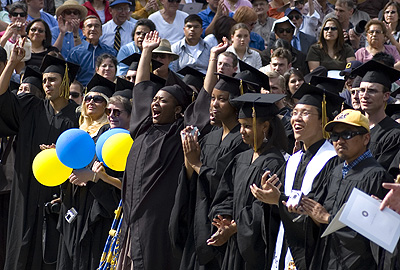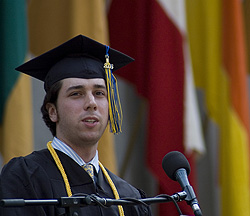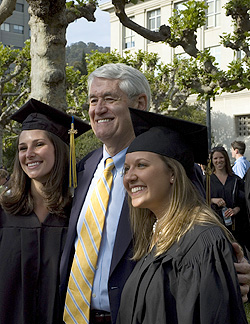UC Berkeley Web Feature
 |
Even the fierce sun and a missing speaker couldn't dampen the jubilance of graduating seniors. (Bonnie Azab Powell photos) |
Convocation 2006 loses its speaker, but not its spirit
BERKELEY – The graduates who gathered yesterday (May 10) for Commencement Convocation 2006 at the Greek Theatre drew their inspiration from cheering families and friends, fellow students and leaders of the campus community, and the special sense of accomplishment that comes wrapped in a Berkeley degree.But they heard no words of forward-looking wisdom from the scheduled keynoter, California Assembly Speaker Fabian Nuñez, who declined to cross a picket line set up outside the Greek to protest "poverty wages" paid to UC custodians, members of the American Federation of State, County, and Municipal Employees.
Chancellor Robert Birgeneau, who made the announcement from the stage, said negotiations had continued right through "the last hour." And while Nuñez "made an absolute guarantee to the union beyond anything I imagined he would do," the chancellor added, "his generous offer was not accepted on behalf of our workers."
Nuñez, said Birgeneau, was "extremely disappointed" at being unable to deliver his address. The members of the Class of '06, though, seemed more than ready to move on with their lives, speech or no speech. When Birgeneau told them the Democratic speaker "will not cross the picket line," in fact, cheers rang out in the cap-and-gown section.
Birgeneau himself pinch-hit for the scheduled speaker, welcoming the graduates to the ranks of the 400,000-plus Berkeley alumni who have preceded them, and congratulating them "on your progress toward a significant reward for all your toil and perseverance — a university degree, but not just any university degree, a University of California, Berkeley, degree."
Declaring a Berkeley education "both an honor and a privilege," he added that "privileges have their consequences," among them "the obligation to give back."
 'I ask of you to try to see things from the eyes of your fellow man, rather than through your television set. I ask of you to go out and see the world ... not just from tourist hotels and fancy restaurants, but from the ground, through the eyes of real people who lead real lives just like we do.' -Lane Rettig, University
Medalist Text of speech |
"You have an obligation to use your talents and all you have learned to make your personal contribution to the betterment of our society and the public who have helped support your education," Birgeneau said. "As you leave Cal, please continue to volunteer your services — whether as a tutor to a needy high-school student, a Big Sister to a young girl in an impoverished neighborhood, or a relief worker in Darfur."
And he reminded the assembled students — representing some 10,000 undergrads and grad students receiving degrees this spring — of the importance of Berkeley's role as a public university. "I often point out with great pride that currently here at Berkeley we have more undergraduates whose family incomes are under $35,000 than all of the Ivy League universities combined," he said. "This is a remarkable achievement, and it represents the public nature of Berkeley more succinctly than any other statistic I might cite."
The public-service theme was picked up by University Medalist Lane Rettig, winner of a $2,500 scholarship as this year's most outstanding graduating senior. Rettig, a computer-science and Japanese double major, dedicated his brief speech to "all the people throughout history who have needlessly lost their lives as a result of ignorance, selfishness, and greed on the part of their fellow man."
Calling on his audience "to live loudly and fiercely to prevent the human events and decisions that caused Hiroshima, Cambodia, Sept. 11, and Iraq, and which continue to threaten millions of innocent souls around the world," Rettig said he was profoundly affected by a conversation he'd had in Hiroshima with survivors of the atomic bomb dropped by a U.S. warplane in 1945.
 At the reception held at the Campanile Esplanade after convocation, students lined up to have parents take their pictures with Chancellor Birgeneau. |
Birgeneau also recognized the five other finalists for the University Medal, which was first awarded in 1871: Brian Loo, Alexis Ashot, Laurel MacKenzie, Siu-Ting Dickson Mak, and Nicole Swan. Other major campus awards went to Farhad Salehian (the Kenneth Priestley Leadership Award), Daniel Carrillo (the Mather Good Citizen Award), and Robert Gregg and Keishia Sheffield (the Ina K. and Roy B. Christie Award).
Paula Silva, chair of the Class of 2006 Gift Committee, announced that 1,200 classmates had donated $51,136 for this year's senior gift, a total that was matched — as was last year's gift — by UC Regent Richard Blum, a '58 Berkeley alum.
As graduates and others entered the Greek before the ceremonies, a small group of about 15 AFSCME picketers stood outside the theater carrying signs reading "Justice now," "Pay our custodians a living wage," and "Sweep out poverty wages."
Although Nuñez was unwilling to cross the picket line, his visit to Berkeley wasn't wasted. While Birgeneau filled in for him at the Greek, the assembly speaker took a personal tour of Lawrence Berkeley National Laboratory, where he met with Steven Chu, the lab's director, for a presentation on the Helios Project, a proposed multidisciplinary research effort aimed at tackling the nation's dependence on fossil fuels. Following the tour, Nuñez also met with selected graduating seniors and faculty — as originally planned — at a dinner reception at the chancellor's home.


